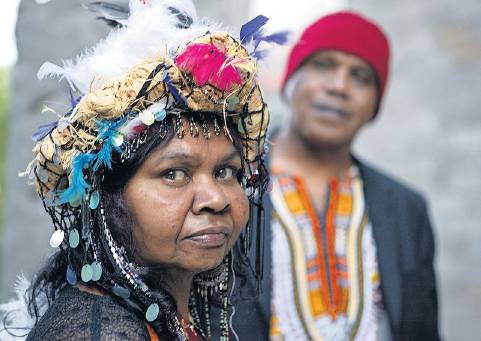Ruby and Archie: a love story built on music and healing
FILM
WASH MY SOUL IN THE RIVER’S FLOW
Rated PG, 84 minutes. In cinemas tomorrow. Reviewed by SANDRA HALL
It wasn’t the most promising start. They met as homeless teenagers at the People’s Palace, the Salvation Army’s Adelaide hostel, in the 1960s. But their meeting spawned a love story. Archie Roach and Ruby Hunter both belonged to the Stolen Generations – taken from their Aboriginal families as small children – and they shared a passion for music. It was enough. They fell for one another and so began a music-making collaboration that lasted until Ruby’s death in 2010.
Wash My Soul in the River’s Flow
is a celebration of this partnership, harking back to 2004 and a concert they gave in Melbourne with Paul Grabowsky and the Australian Arts Orchestra before an audience of 2000. A night of song and conversation dedicated to Ruby’s life and work, it ended with a standing ovation, won a Helpmann Award and went on to be staged again in Sydney and at the Adelaide Festival.
Philippa Bateman’s film marries parts of the concert with rehearsal footage and backstage interviews and reminiscences that haven’t been shown before, and behind the music, she’s cut together a mesmerising series of studies of the Murray River and the Coorong at their most serene. It was here, the country of the Ngarrindjeri people, where Ruby spent her early childhood.
A vital, diminutive figure who favoured a head-dress of multicoloured feathers and wisps of straw when onstage, Ruby had a warm, husky contralto and, like Roach, a gift for transforming her regrets and losses into songs. When she was taken away from her birth family, she was eight – old enough to retain memories of her siblings and the times they spent together playing along the Murray’s banks. Her song, Daisy Chains, String Games and Knuckle Bones is inspired by this period while Down City Streets speaks of her later years in Adelaide as a teenager without a home.
Roach was taken from his family at three and eventually found a haven with music-loving foster parents. Their older daughter gave him lessons in the guitar and keyboard and his foster father shared his enthusiasm for jazz. These were the building blocks of a career that has taken him all over the world to play with the best, among them Bob Dylan, Paul Simon and Sting.
And his songs here are enhanced by Grabowsky’s orchestra and their jazz arrangements. But the highlight of this fond, lyrical tribute to the two artists and their life together is Took the Children Away, Roach’s powerful lament for the Stolen Generations. He first performed it in 1988, when it served to amplify a debate which had been simmering since the early ’80s, and it’s lost none of its potency as an anthem for those who lost so much.
